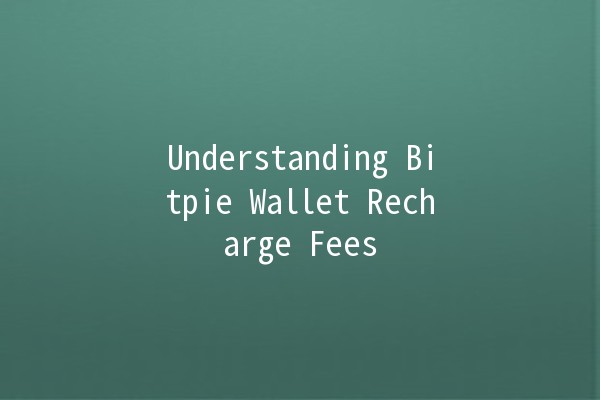
In today's fastpaced digital age, utilizing cryptocurrency wallets has become a norm for many individuals and businesses. Among these wallets, Bitpie Wallet stands out due to its userfriendly interface and a variety of features. However, as users seek to recharge their wallets, they often encounter a multitude of fees and charges. In this article, we will delve into the specifics of Bitpie Wallet recharge fees, while providing practical tips to enhance your experience.
What is Bitpie Wallet?
Bitpie Wallet is a multicurrency wallet that allows users to store, manage, and trade various cryptocurrencies securely. Its unique selling points include:
MultiCurrency Support: Users can manage multiple types of cryptocurrencies from a single wallet.
UserFriendly Interface: The design is intuitive, making it accessible for both beginners and seasoned users.
Security Features: Strong encryption methods are employed to secure your assets.
While the wallet provides a plethora of features, understanding the associated recharge fees is crucial for effective management.
Types of Recharge Fees in Bitpie Wallet
When recharging your Bitpie Wallet, several fees may apply:

Understanding these fees can help you choose the best method for recharging your wallet.
Tips for Reducing Recharge Fees
Here are several strategies to consider that can help you minimize your overall costs when using Bitpie Wallet:
Cryptocurrency prices and network fees can fluctuate over time. Monitoring these can save you significant amounts. For instance, network fees are often lower during nonpeak hours. Use tools or apps that show realtime network congestion and fees to make informed decisions.
Example: If you notice that transaction fees drop significantly overnight, plan to perform your wallet recharge at that time.
Certain cryptocurrencies have lower transaction fees than others. For instance, if you are charged a large fee for Bitcoin transactions, consider using cryptocurrencies with lower fees for recharges, like Litecoin or Stellar.
Example: Transferring $100 worth of Litecoin may incur a mere $0.10 fee versus a $5 fee for Bitcoin.
When recharging your wallet via exchanges, choose platforms that offer lower fees or have promotional events. Some exchanges allow users to buy cryptocurrencies without any service fees on specific days.
Example: If you frequent an exchange that often runs a "nofee Sunday" promotion, save your transactions for that day.
If possible, consolidate multiple transactions into one. Some wallets allow batch transfers, which can significantly reduce your overall fees.
Example: Instead of sending out multiple smaller transactions, group them and send one larger transaction may reduce network fees.
Some cryptocurrencies allow users to earn interest or rewards through staking programs. Money earned can then be used to compensate for any fees incurred while recharging.
Example: By staking a portion of your crypto assets, you might earn enough rewards to cover future recharge fees.
Enhancing Your Bitpie Wallet Experience
Apart from understanding and managing fees, there are additional steps users can take to improve their overall experience with Bitpie Wallet:
Security Measures
Security should always be paramount. Make use of twofactor authentication (2FA) and keep your recovery phrases secure.
Regular Updates
Ensure that your Bitpie Wallet app is updated regularly to leverage new features and security enhancements.
Engage with the Community
Join forums and discussion groups related to Bitpie Wallet. Engaging with other users can provide insights into best practices and tips to save on fees.
FAQ Section
The network transfer fees vary significantly depending on the cryptocurrency used. Generally, Bitcoin fees can range from $1 to $10, while fees for Ethereum may hover around $0.50 to $
Bitpie Wallet does impose certain limits based on the user's activity and verification status. New users may face stricter limits until their accounts are verified.
Always read the fine print before making transactions. Some services may present seemingly low fees but charge hidden costs. Always utilize reputable exchanges and read reviews from other users.
Yes, Bitpie Wallet supports various payment methods, including credit cards, bank transfers, and cryptocurrency transfers. You can easily select your preferred method when recharging.
In case of a transaction failure, first check your network conditions. If the fees were deducted but the recharge was unsuccessful, reach out to Bitpie Wallet customer support with your transaction ID for assistance.
There is no limit on how often you can recharge your wallet. However, be aware of potential fees that may accrue with frequent transactions.
Understanding the recharge fees associated with Bitpie Wallet is vital for managing your cryptocurrency assets effectively. By implementing the tips and strategies outlined above, users can significantly reduce their costs and enhance their overall experience. Keep informed, choose wisely, and enjoy your cryptocurrency journey with Bitpie Wallet!

